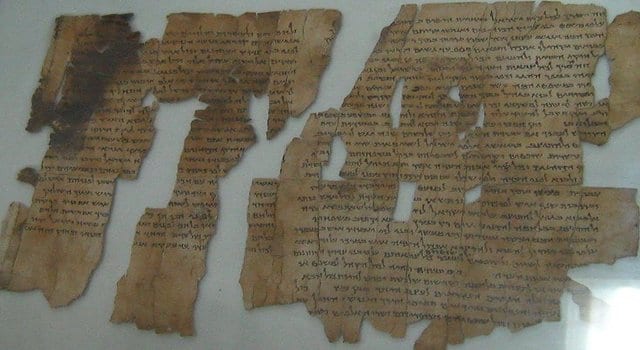
William Kando, son of the Palestinian Christian man who bought four of the original Dead Sea scrolls from the Bedouin shepherd who found them, is offering to sell some of the remaining fragments his family still holds. The fragments in his possession range in size from a few centimetres to the size of a cereal box. Amir Ganor, head of the Israel Antiquity Authority’s anti-looting squad, says these sales are illegal, as all the fragments belong to Israel, but over the past several years, evangelical Christian collectors and US institutions have been buying up the pieces.
Although he did not keep those four first scrolls, over the years during which further scrolls and fragments were found, several more were sold to Kando’s father. Many of them he sold, in turn, to museums, state collections, and academic and religious institutions, but some he kept for himself, hiding them in a Swiss safe-deposit box in the 1960s. When he died in 1993, his son decided to offer them for sale to collectors.
Since seizing control of east Jerusalem during the Six-Day War in 1967, and along with it, most of the Dead Sea Scrolls, Israel has maintained that the entire collection is Israel’s cultural property. In 1978, the Israeli government passed a law outlawing the unauthorized removal of such antiquities from the country. Kando, however, says that his father took their collection to Switzerland before the law was passed, and therefore the family has done nothing illegal by keeping the collection there and selling it off. Israeli authorities have been monitoring Kando’s deals and offerings since 1995 in an effort to determine what he has left. Current estimates suggest he has about twenty pieces remaining.
The scrolls themselves are of such interest to Israel because they represent the earliest copies of the Hebrew Bible ever found. They are about 2000 years old and written on animal skin. In addition to the traditional Biblical texts, the collection includes several extra-biblical writings, evidence that at the time, the canon was still in flux.
Israel displays part of its collection in the Shrine of the Book at the Israel Museum in Jerusalem. The rest it keeps in a climate-controlled lab at the museum. The collection includes over 10,000 fragments, many of which have not even been studied yet. Among the most important pieces currently in Israel’s possession is The Temple Scroll, so-called because it discusses the construction of the Temple, which was, interestingly, obtained originally from the senior Kando. The Temple Scroll is the longest scroll ever discovered, measuring 8.15 meters (26.7 feet) in length. Although they want all the fragments returned, the IAA is particularly interested in the cereal-box-sized fragment that remains: it is well-preserved and contains a segment of the text of Genesis.



